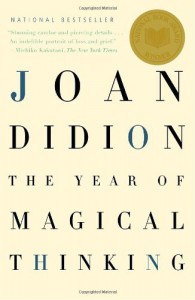
REVIEW: The Year of Magical Thinking

This month I lost of very close friend of mine, one who was taken from this world way before his time. I've been struggling to find a way to come to terms with this loss, to accept it, to understand it… if any of that is even possible. So, a friend recommended The Year of Magical Thinking to me, thinking that it might help me through the grieving process.
The Year of Magical Thinking chronicles Joan Didion's thoughts following her husband's death. It's not a self-help book, it's a memoir, but because of that, it's infinitely more relatable.
This was very painful for me to read, and yet, it helped me to understand some of my own thoughts and feelings, which I've resisted trying to articulate to other people. I found myself crying throughout the book, and not necessarily because of my sympathy for Joan (even though I certainly did feel that), but because I was realizing my own truths and reliving my own memories through her writing. I know all too well, painfully, the feeling of thinking that I should be able to change the outcome, change what happened somehow.
I wanted more than a night of memories and sighs.
I wasn't always brave enough to read this book, since it forced me to confront a lot of things within myself that I didn't necessarily feel ready to confront. Instead, I've preferred immersing myself in escapist fantasy literature, because it's just easier that way. Joan's daughter Quintana's initial condition and infection reminded me so painfully of my friend's eventual situation, that there was a point during which I would read a sentence, then put the book down… then read a sentence, then put the book down… until I finally managed to get through the offending section.
Grief turns out to be a place none of us know until we reach it.
So, how do I give a rating to a book like this, a book that I used as a vessel in my own personal journey toward confronting my own grief? I didn't read it to learn about Joan's life with her husband or daughter, I read it to find words for what I was thinking and feeling.
I know why we try to keep the dead alive: we try to keep them alive in order to keep them with us.
I know also that if we are to live ourselves there come a point at which we must relinquish the dead, let them go, keep them dead.
Knowing doesn't make it easier of course, relating to a book doesn't make it easier, but perhaps it's all a step toward that eventuality.
I see a lot of reviews condemning the book because Joan and her husband lived a blessed and quite luxurious lifestyle, one that most of us will never know. And yet, isn't death the great equalizer? Should we begrudge her this grief because she had an amazing life that most of us can only envy? We can't relate to her life, but can't we relate to her grief? As her husband John once said, "It all evens out in the end." Bad news will come to each of us.
The craziness is receding but no clarity is taking its place. I look for resolution and find none.
There can be no resolution in grief, perhaps, but maybe there can be clarity. And in The Year of Magical Thinking, I think I've come close to finding that, at least.










